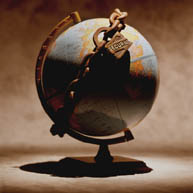Security in the real world
As an intern for the Research Group in International Security (REGIS), I get to attend events where some of the most knowledgeable experts in international security come together to discuss current issues in our global community. On October 19-20, 2007, I had the opportunity to attend the ISAC/ISSS Conference "Global Security Challenges: When New and Old Issues Intersect," organized by T.V. Paul, James McGill Professor of International Relations, who teaches security-related courses in Political Science. Graduate students, professors, military specialists and security experts gathered for what amounted to an incredibly productive, two-day brainstorming session.

iSTOCK PHOTO
The 125 attendees were from institutions in all parts of the world, including King's College London, the US Air Command and Staff College and the University of Bombay, among many others. There were 24 panels held over the course of the conference, with three to six papers presented in each panel; I sat in on three panels and heard a dozen presentations. Some of the topics covered were civil-military relations, nuclear politics and East Asian security issues.
The presentations underscored just how complex international security is, and that it must be studied from a multidisciplinary perspective that embraces both theoretical and practical aspects of security. Desmond Morton, a renowned historian and professor at McGill, spoke about the lessons of the past for current security problems, such as the challenges faced in Afghanistan. The lunchtime speaker, Jody Heymann, Canada Research Chair in Global Health and Social Policy, discussed how scientific factors such as disease and environmental threats are contributing to new definitions of international security.
The conference connected international relations theory and the "real world" in a way that you just can't get from a textbook.
What I found most valuable was the linking of practical experience with theoretical approaches to security. Some presenters had an academic background in international relations or sociology, with in-depth knowledge of theoretical frameworks used to study security issues, while others had a military background with a profound understanding of tactics and strategies. This kind of back and forth in terms of helpful critiques and recommendations happened during all of the panels I attended. The audience was also very enthusiastic about asking questions and making suggestions, while the presenters were receptive to these and were eager to respond to them.
It was fascinating to ask presenters why they became interested in international security. Many times, their family members or they themselves had been affected by conflict. I have always been fascinated with conflict because of the monumental effects it can have on a person, a community, a country, and even the world. Growing up, I was often reminded of how different my life would be had WWII not occurred, had my grandfather not been put in a concentration camp, and had my family not lost everything. I was taught to cherish the fact that I do not live in constant fear and uncertainty and to understand that while we have the capacity to be peaceful and cooperative, we also have the capacity to be aggressive and destructive. Furthering our understanding of why the latter manifests itself and can lead to large-scale violence is vital in order to successfully prevent and manage conflict—this was the goal of the conference and is why I became interested in International Security.
It was also useful to speak with people who are experts in their field to get a sense of what kind of education and work experience they have, as well as the opportunities they see for themselves in the future. I, like many students who are nearing the end of their undergraduate studies, am trying to find some direction with regards to what kind graduate studies I would like to do and what kind of career I might like to pursue later on. Speaking with military experts helped me to realize that the pro-war, one-track mind attitude many of us assume is the norm in the military field is a misperception. Many of the professors at military colleges present at the conference push their students to study and understand the history underlying conflicts, interventions and crises. "Learn from past mistakes" is certainly a message that was voiced many times over.
Julia Ivonoffski is an undergraduate student in the Faculty of Arts at McGill University. She is in the process of completing an Honours Degree in Political Science, with a concentration in International Relations.
Editor's Note: The McGill Reporter welcomes first-person accounts from students on any McGill-related activity or event such as conferences, lectures, seminars, etc. For submission guidelines, please contact neale.mcdevitt@mcgill.ca.

